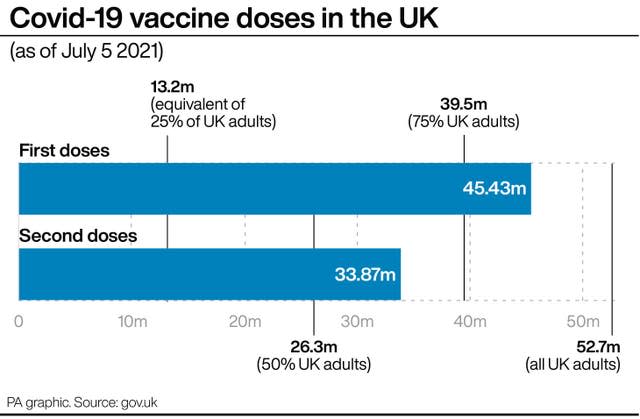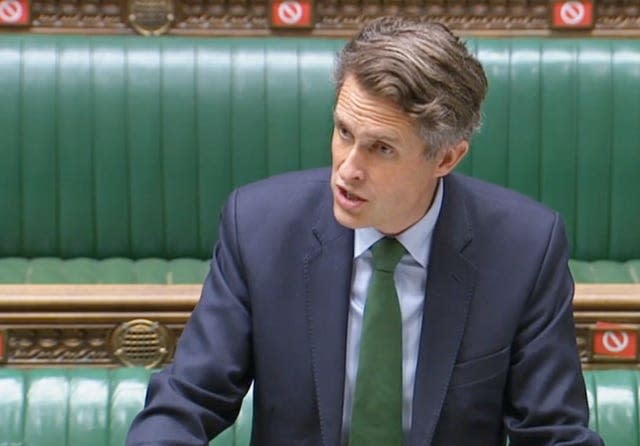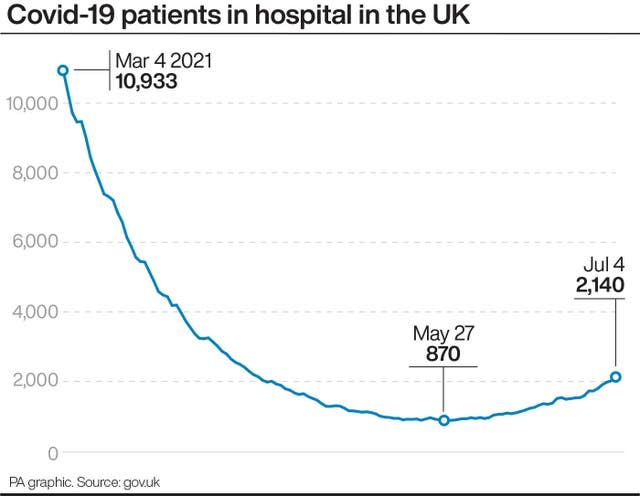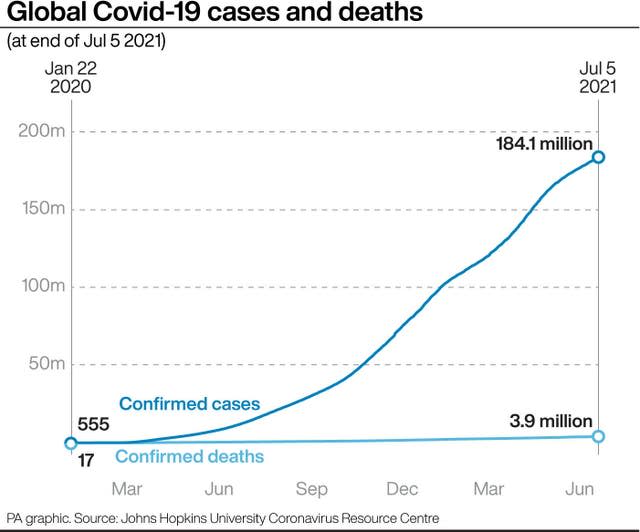Self-isolation rules to be eased for children and the double-jabbed
Rules on self-isolation are being eased for the fully vaccinated and under-18s as Boris Johnson’s Government continued efforts to strip away England’s coronavirus restrictions.
People in those categories who have come into contact with a coronavirus case will not need to shut themselves away for the 10-day isolation period once the change comes into force on August 16.
They will be advised to take a coronavirus test, but that will not be compulsory.

Meanwhile the “bubble” system in schools will be scrapped following concerns about large groups of children being forced to miss out on education if cases were detected.
The announcements follows Mr Johnson’s decision to tear up England’s coronavirus regulations at Step 4 of the road map, expected on July 19.
Health Secretary Sajid Javid said: “Step by step, jab by jab, we are replacing the temporary protection of the restrictions with the long-term protection of the vaccine so we can restore the freedoms which we cherish and the experiences which mean so much for us all.”
From August 16 anyone who is a close contact of a positive case will no longer have to self-isolate if they have received two doses of a vaccine and have given the second jab a fortnight to take effect.
As under-18s are not routinely jabbed, a similar exemption from self-isolation rules will be extended to them.
Contacts will be encouraged to take a PCR test, and anyone who is positive for coronavirus will have to self-isolate, regardless of their vaccination status.

“This new approach means that we can manage the virus in a way that is proportionate to the pandemic while maintaining the freedoms that are so important to us all,” Mr Javid said.
Education Secretary Gavin Williamson set out plans to scrap the “bubble” system which has led to classes – or even whole schools – being forced to stay at home.
Around 640,000 state school pupils – 8.5% of England’s total – did not attend class for Covid-related reasons on July 1, according to Department for Education (DfE) statistics.

Mr Williamson said: “We recognise that the system of bubbles and isolation is causing disruption to many children’s education.
“That is why we’ll be ending bubbles and transferring contact tracing to the NHS Test and Trace system for early years settings, schools and colleges.”
The changes will come in at Step 4 of the road map.
Transport Secretary Grant Shapps will update MPs later this week on how to remove the need for fully-vaccinated arrivals to isolate when they return from an amber list country.
The announcements follow Mr Johnson’s gamble on trusting vaccines and the common sense of the English public, once legal restrictions in England are lifted.
Mr Javid suggested cases could rise to more than 100,000 a day in the summer once the rules are removed.

He told MPs: “I understand that some people are cautious about the idea of easing restrictions, but we must balance the risks – the risks of a virus that has diminished but not defeated, against the risks of keeping these restrictions and the health, social and economic hardship that we know they bring.”
Shadow health secretary Jonathan Ashworth called for a “U-turn on mask-wearing”, telling Mr Javid: “Yes, let’s have freedom, but not a high-risk free-for-all.
“Keep masks for now, fix sick pay, and let’s unlock in a safe and sustainable way.”
The latest official figures showed a further 28,773 daily reported cases in the UK with 37 deaths within 28 days of a positive test.
More than 79 million people have now received a first dose of the vaccine, with almost 34 million fully vaccinated.

England’s chief medical officer Professor Chris Whitty said the vaccine rollout and attempts to suppress coronavirus infection rates must go “hell for leather” in order to prevent a significant increase in long Covid.
Speaking at the Local Government Association’s conference he said: “Since there’s a lot of Covid at the moment and the rates are going up, I regret to say I think we will get a significant amount more long Covid, particularly in the younger ages where the vaccination rates are currently much lower.”
It was not clear how much of a problem long Covid would be “but I think we should assume it’s not going to be trivial”.
In other developments:
– Deaths exceeded births in 2020 by 6,438 as the pandemic ripped through the country, the first time that has happened since 1976, according to provisional figures from the Office for National Statistics.
– Scotland’s Finance Secretary Kate Forbes said there will be “fundamental differences” to England after July 19 with certain restrictions north of the border continuing for a much longer time.
– Northern Ireland’s Deputy First Minister Michelle O’Neill branded the UK Government’s approach to removing restrictions “reckless” and said “we will not be following Boris Johnson’s model”.
– England’s entire one-day cricket squad was forced into isolation by a Covid-19 outbreak ahead of the series against Pakistan.

Experts said the approach taken by Mr Johnson was based on the weakened link between an increase in cases being inevitably followed by a rising death toll.
Professor Calum Semple, a member of the Scientific Advisory Group for Emergencies (Sage), told Times Radio: “We do have good data now that does indicate we are gradually breaking the links in the chain between community cases and severe cases in hospital.”
Another government adviser, Professor Neil Ferguson, said he expected the impact of the vaccines would keep deaths far lower than in previous waves.
“So the third wave, even if the number of cases per day gets very high, we’re still likely to see lower numbers of hospitalisations and deaths than we saw back in December and January just gone,” he told BBC Radio 4’s Today.


